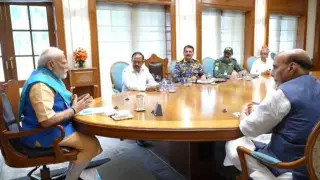
X/Canva
Faizabad parliament constituency saw a change of power this election 2024 as it uprooted the BJP from the same temple town of Ayodhya where Ram Mandir was set up. The BJP expected a solid win due to the massive mandir factor that was inaugurated by PM Narendra Modi himself nearly four months ago that would cement their win but what happened was unexpected.
The BJP honoured a three-decade-old pledge with the opening of the renowned temple in Ayodhya in January of this year. The party had also made reference to the commitment at nearly every campaign rally throughout the country's massive two-month-long electoral process. However, the BJP's campaign failed against its INDIA Bloc partner, the Samajwadi Party, in the race at Ayodhya's Faizabad and more than half of Uttar Pradesh's 80 seats are being contested by the Samajwadi Party, with the Congress having the upper hand.
Lallu Singh, a sitting BJP MP from Faizabad, lost to Samajwadi Party leader Awadhesh Prasad. It was a margin of 54,567 votes that cost him the seat. Nine-time MLA Prasad received 5,54,289 votes, while Lallu Singh received 4,99,722. Election Commission statistics show that Sachidanand Pandey of the BSP received 46,407 votes. "There must have been something wrong with me that prevented me from defending your and Ayodhya's dignity. We could not have won in the Ayodhya parliamentary region for some reason, Lallu Singh stated.
Even though the BJP could not secure 400 seats, the shocking loss in Ayodhya was very severe. With unemployment and inflation gaining precedence as election issues, the Ram Temple opening failed to resonate with voters and did not produce the electoral dividend that the BJP had hoped for.
One of the things that contributed to the BJP's crushing defeat is believed to have been the discontent among merchants and residents of Ayodhya town and Faizabad city over the "poor" compensation for the demolition of homes and businesses along the road leading to the temple. The caste system and politics of the temples and mosques will not always win people over.
Voter Fatigue: Despite the inauguration of the Ram Temple, which was anticipated to be a major draw for Hindu voters, there was a notable lack of enthusiasm and lower voter turnout. This suggests that voter fatigue and a sense of complacency may have set in, diminishing the expected boost from the temple's inauguration.
Caste Dynamics: The shifting caste dynamics in Ayodhya and broader Uttar Pradesh played a significant role. Traditional caste-based voting patterns appeared to favour the opposition, particularly the Samajwadi Party, which has strong support among certain caste groups. This shift undermined the BJP’s traditional voter base in the region.
Local Issues and Governance: Local governance issues and dissatisfaction with BJP’s local leadership might have also contributed. Voters often hold the ruling party accountable for regional and local governance failures, which can significantly impact election outcomes at the constituency level.
Opposition Strategies: The opposition, particularly the Samajwadi Party, effectively mobilized their base and capitalized on the dissatisfaction with the BJP. This included strategic alliances and focusing on local issues that resonated more with the electorate.
The aggressive measures taken by the Yogi Adityanath-led Uttar Pradesh government to combat unlawful encroachments in Ayodhya are also commonly cited as contributing to the BJP's defeat.













Copyright © 2025 Top Indian News
